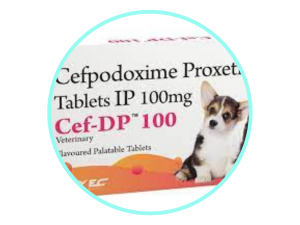





Simplicef for dogs is a vet-prescribed medication that’s used to treat certain bacterial infections. While it’s not suitable for all dogs, this powerful antibiotic can help relieve symptoms within just a few days. But be sure to give your pet the entire course to ensure the infection is entirely gone.
At AvenueDogs.com, we’re committed to giving the latest information on all things dog-health related. We want you to have everything at your fingertips so when it comes time to make a decision, you’re well-informed.
Remember, the information we provide is not meant to replace the advice of a trained professional. Your veterinarian is equipped to recommend the best route to take for getting your pup back to their optimal health. With that in mind, let’s get started!
If you’d like to know more about medications that can help your pet, check out our vet-approved list below:
| Dyne for Dogs: For Energy & Weight Gain | Omeprazole for Dogs: For Ulcers & Inflammation | Enrofloxacin for Dogs: For Bacterial Infections |
Cefpodoxime for Dogs: For Bacterial Infections | Sucralfate for Dogs: Chronic Upset Stomach | Cosequin for Dogs: For Joint Health |
| Ursodiol for Dogs: For Liver & Gallbladder | Trazodone for Dogs: For Anxiety & Aggression | Mometamax for Dogs: For Ear Infections |
| Credelio for Dogs: For Ticks & Fleas | Chlorpheniramine for Dogs: For Allergy-Related Conditions | Butorphanol for Dogs: For Painful Coughs |
| Dinovite for Dogs: For Irritating, Itchy Coat | Dasuquin for Dogs: For Joint Health | Meloxidyl for Dogs: For Pain & Inflammation |
| Glandex for Dogs: For Digestive Support | Rilexine for Dogs: For Bacterial Infections | Enalapril for Dogs: For Cardiac Conditions |
| Quercetin for Dogs: For Allergy & Inflammation | Carprovet for Dogs: For Pain & Inflammation | Pimobendan for Dogs: For Congestive Heart Failure |
| Simplicef for Dogs: For Bacterial Infections | Clindamycin for Dogs: For Bacterial Infections |
Until then, check out some vet-approved info on Simplicef for dogs.
Top 10 FAQs for Simplicef for Dogs
We get a ton of questions from our readers when it comes to pet health. One medication we often get asked about is Simplicef for dogs. Here’s just a few questions that seem to be on the minds of our readers:



Angela David asks – “What is Simplicef for dogs used for?”
Petey73 wanted to know – “My dog is dealing with respiratory issues. He started Simplicef 2 days ago. When will I start to see him getting better???”
Doglover2334 asks – “A friend of mine suggested Simplicef to treat my nursing dog’s UTI. They have a leftover prescription. Can I use it?”
At AvenueDogs.com, we do not provide healthcare advice for your pet. Instead, our aim is to give you the pros and cons of each of these medications. That way you can prompt a conversation with your pet’s veterinarian and be a part of the decision-making process.



We’ve narrowed it down to 10 of the most asked questions to give you an idea of what this medication is all about. After we get that out of the way, we’ll take a deeper dive into Simplicef for dogs and what it can (and can’t) do for your pet.
#1 What is Simplicef used for in dogs?
Simplicef is an antibiotic that treats bacterial infections in dogs, such as skin infections, urinary tract infections, and respiratory infections. It kills bacteria by disrupting their cell walls.
#2 How long does it take for Simplicef to work?
You may notice improvement within a few days, but it’s crucial to complete the full course prescribed to fully eradicate the infection.
#3 Can Simplicef cause side effects in dogs?
Possible side effects include vomiting, diarrhea, and loss of appetite. Rarely, serious allergic reactions can occur. Consult your vet if any symptoms arise.
#4 Is Simplicef safe for all dogs?
While safe for most dogs when prescribed, it should not be given to those allergic to cephalosporins or penicillin, or with kidney or liver disease, without vet supervision.
#5 Does Simplicef require a prescription?
Yes, a veterinarian must prescribe Simplicef, ensuring it’s used correctly for the diagnosed bacterial infection.
#6 How should Simplicef be administered to dogs?
Give orally, once daily, with or without food. If given with food, it may reduce the risk of stomach upset.
#7 Is there a generic version of Simplicef, and is it as effective?
Yes, the generic name for Simplicef is cefpodoxime proxetil. The generic version is just as effective when used under the guidance of a veterinarian to treat the same conditions as the brand-name drug.
#8 Can Simplicef be used to treat viral infections?
Simplicef is only effective against bacterial infections and will not work for viral infections.
#9 How is Simplicef stored?
Store at room temperature in a dry place, away from light and moisture. Keep it in its original packaging.
#10 Can Simplicef interact with other medications?
Yes, it can interact with other drugs, including antacids and some antibiotics. Inform your vet about all medications your dog is taking.



Think Simplicef could be the best route for your dog? Then, let’s check each of the questions above out in more depth. If by the end of this article, you still think Simplicef for dogs is the best option, you can open a well-informed dialogue with your vet.
What is Simplicef for Dogs?



Simplicef for dogs, generically known as cefpodoxime proxetil. It’s an oral antibiotic prescribed to treat infections caused specifically by susceptible bacteria. Simplicef is commonly used for conditions such as:
- Skin infections (including wounds and abscesses)
- Certain urinary tract infections
- Respiratory infections in dogs
This medication is favored for its convenient once-daily dosing, making it easier for pet owners to manage their dog’s treatment regimen.
What Does Simplicef for Dogs Do?



Simplicef for dogs acts by targeting and inhibiting the growth of bacteria responsible for causing infections. The active ingredient (cefpodoxime proxetil) disrupts the bacteria’s cell wall formation, a critical component for their survival.
This disruption leads to the death of the bacteria, effectively treating infections such as skin wounds, abscesses, and certain urinary and respiratory tract infections.
By eliminating the bacteria, Simplicef helps in the recovery from these infections, contributing to the overall health and well-being of your dog.



Simplicef for Dogs Dosage



The dosage of Simplicef for dogs is determined based on the dog’s weight and the specific nature of the infection being treated. Typically, the recommended dosage is 2.3 to 4.5 mg of Simplicef per pound of the dog’s body weight, administered once daily. The exact dosage within this range depends on the severity of the infection and the dog’s overall health condition.
For example, a dog weighing 20 pounds might receive a dose ranging from approximately 46 mg to 90 mg once daily, as prescribed by a veterinarian. The duration of the treatment usually spans from 5 to 14 days, again depending on the type and severity of the infection, with the veterinarian’s recommendation being crucial to ensure effective treatment.
It’s important for dog owners to follow the veterinarian’s dosage instructions carefully and to complete the full course of antibiotics. Continue use even if the dog appears to have recovered, to prevent the development of antibiotic resistance and ensure the infection is fully resolved.



Simplicef for Dogs Dosage Chart
| Dog’s Weight(pounds) | Dog’s Weight(kilos) | Simplicef Dosage Low (mg) | Simplicef Dosage High (mg) |
| 10 | 4.54 | 23.0 | 45.0 |
| 20 | 9.07 | 46.0 | 90.0 |
| 30 | 13.61 | 69.0 | 135.0 |
| 40 | 18.14 | 92.0 | 180.0 |
| 50 | 22.68 | 115.0 | 225.0 |
| 60 | 27.22 | 138.0 | 270.0 |
| 70 | 31.75 | 161.0 | 315.0 |
| 80 | 36.29 | 184.0 | 360.0 |
| 90 | 40.82 | 207.0 | 405.0 |
| 100 | 45.36 | 230.0 | 450.0 |
Remember, the above chart is just a starting point based on your dog’s size. A veterinarian will help make an informed decision about what dosage of Simplicef is the ideal route to take for maximum safety and efficacy.



How is Simplicef for Dogs Administered?
Simplicef for dogs is administered orally. The medication comes in tablet form and can be given to dogs either with or without food. However, giving it with food may help to reduce potential gastrointestinal side effects like upset stomach.
Note: The tablet should not be crushed or broken but given whole to ensure the correct dosage is delivered and to maintain the integrity of the medication’s formulation.
Consistency in administering the medication at the same time each day can help maintain optimal levels. Continued antibiotics in the dog’s system is essential to the successful treatment of the infection.









What if I Miss a Dose of Simplicef for Dogs?
If a dose is missed, it should be given as soon as possible. However, if it’s almost time for the next dose, skip the missed dose and return to the regular schedule. Do not double up on doses.
Does Simplicef for Dogs Require A Prescription?





Yes, Simplicef for dogs requires a prescription from a veterinarian. It is a potent antibiotic that is used to treat specific bacterial infections. Its use must be overseen by a professional to ensure it is appropriate for the dog’s condition.
A veterinarian will determine the necessity of this medication based on a diagnosis of the infection, its severity, and the overall health of the dog.
Additionally, obtaining Simplicef for dogs through a prescription ensures that the medication is used correctly. A veterinarian can help decide the right dosage, and the appropriate duration to effectively treat the infection with minimal risk of antibiotic resistance.



What Alternatives Are There for Simplicef for Dogs?
When Simplicef (cefpodoxime proxetil) is not suitable for a dog, there are several alternative antibiotics that veterinarians might consider. A vet may decide another route is better due to a specific bacterial resistance, allergy to cephalosporin antibiotics, or other considerations.



Depending on the infection’s nature and sensitivity, these alternatives include:
- Amoxicillin/Clavulanic Acid (Clavamox) – A broad-spectrum antibiotic that combines amoxicillin with clavulanic acid to overcome bacterial resistance, effective for skin and soft tissue infections, as well as urinary tract infections.
- Cephalexin – Another cephalosporin antibiotic, similar to Simplicef, effective against a wide range of bacterial infections including skin and urinary tract infections. It usually requires twice-daily dosing.
- Doxycycline – A tetracycline antibiotic effective against a wide array of bacterial and protozoal infections. It’s often used for respiratory and tick-borne diseases.
- Enrofloxacin (Baytril) – A fluoroquinolone antibiotic used for a variety of infections, including skin, urinary tract, and respiratory infections. It’s known for its potent antibacterial activity.
- Clindamycin – An antibiotic that is particularly effective against certain types of bacteria, such as those causing dental and bone infections, as well as soft tissue infections.
- Metronidazole – While not a direct alternative for the same range of bacterial infections as Simplicef, metronidazole is effective against anaerobic bacteria and certain protozoa, often used for gastrointestinal infections.
The choice among these alternatives depends on several factors, including the specific bacteria involved, the site of the infection, the dog’s medical history, and any potential drug interactions. Veterinarians will select the most appropriate antibiotic after evaluating these factors.



When Will You See Results from Simplicef for Dogs?



The time to see results from Simplicef for dogs can vary depending on the type of infection being treated and its severity. The individual dog’s overall health and response to the antibiotic can be a determining factor as well. Generally, some improvement in symptoms may be noticeable within a few days of starting treatment.
- For skin infections, pet owners might observe a reduction in redness, swelling, or discharge in as little as 3 to 5 days.
- For more systemic or severe infections, it may take a bit longer to see noticeable improvements.
It’s important for pet owners to continue administering the medication for the entire duration prescribed by the veterinarian, even if the dog appears to be better. Completing the full course of antibiotics ensures that the infection is fully eradicated. In addition, it helps prevent the development of antibiotic-resistant bacteria.



Simplicef for Dogs Side Effects



Simplicef (cefpodoxime proxetil) is generally well-tolerated by dogs, but like all medications, it can cause side effects in some animals. The most common side effects are related to the gastrointestinal system and may include:
- Vomiting – Some dogs may experience vomiting after taking the medication.
- Diarrhea – Loose stools or diarrhea can occur.
- Nausea – Signs of nausea might be observed, such as drooling or a lack of appetite.
- Loss of Appetite – Dogs may show less interest in food.
Less commonly, dogs might experience:
- Allergic Reactions – Signs could include itching, hives, swelling of the face, or difficulty breathing. These are more serious and require immediate veterinary attention.
- Changes in Bloodwork – Long-term use could potentially affect kidney or liver function, which is why monitoring through blood tests may be recommended for prolonged treatments.
It’s important to monitor your dog for any signs of side effects and report them to your veterinarian.



Are There Any Risk Factors for Simplicef for Dogs?





When prescribing Simplicef for dogs, veterinarians consider certain risk factors to ensure it’s a suitable treatment option. These risk factors include:
- Allergy to Cephalosporins – Dogs with a known allergy to cephalosporin antibiotics or penicillin should not take Simplicef, as there could be a risk of an allergic reaction.
- Pregnancy and Nursing – The safety of Simplicef in pregnant or nursing dogs has not been fully established. It should only be used when the benefits outweigh the risks, and it’s prescribed under the discretion of a veterinarian.
- Pre-existing Conditions – Dogs with kidney or liver disease may require adjusted dosages or close monitoring while on Simplicef, as these conditions can affect how the drug is metabolized and eliminated from the body.
- Age – Very young puppies or elderly dogs might be more sensitive to the effects of antibiotics and could require special consideration in terms of dosing and monitoring.
- Interaction with Other Medications – Simplicef can interact with other medications, so it’s important to inform the veterinarian about any other treatments your dog is receiving to avoid adverse interactions.
These factors are considered by the veterinarian when deciding on the best treatment approach, ensuring that Simplicef is used safely and effectively to treat bacterial infections in dogs.



Are There Any Drug Interactions with Simplicef for Dogs?





Yes, there are potential drug interactions when using Simplicef for dogs. Some of the known or possible drug interactions include:
- Antacids or H2 Blockers – Medications that reduce stomach acid may decrease the absorption of Simplicef, potentially reducing its effectiveness.
- Other Antibiotics – Concurrent use of certain antibiotics, especially bacteriostatic antibiotics (those that inhibit bacterial growth rather than kill bacteria), may interfere with the effectiveness of Simplicef, which is bactericidal (kills bacteria).
- Probenecid – This drug, used to treat gout in humans, can interfere with the renal excretion of cefpodoxime, potentially leading to increased levels of the antibiotic in the blood and an increased risk of side effects.
- Warfarin – There is a potential for increased anticoagulant effects when cephalosporins, like Simplicef, are used with warfarin, requiring close monitoring of blood coagulation parameters.
These interactions highlight the importance of providing your veterinarian with a complete list of medications. This includes over-the-counter drugs and supplements that your dog is currently taking.



How to Store Simplicef for Dogs



Simplicef (cefpodoxime proxetil) for dogs should be stored properly to maintain its effectiveness and safety. Here are the general storage guidelines:
- Temperature – Keep the tablets at room temperature, typically between 68°F to 77°F (20°C to 25°C). Avoid storing them in places that are prone to significant temperature fluctuations, such as bathrooms or kitchens, or in direct sunlight.
- Moisture – Store Simplicef in a dry place. Moisture can affect the medication, so it’s important to keep it in its original container with the lid tightly closed to protect it from humidity.
- Light – Keep the medication away from direct light, as exposure can degrade some medications over time.
- Safety – Store it out of reach of children and pets to prevent accidental ingestion.
- Expiration Date – Pay attention to the expiration date on the package. Do not use the medication beyond this date, as its effectiveness could be reduced or compromised.
Following these storage instructions helps ensure that Simplicef remains effective for treating your dog’s bacterial infections.



Is Simplicef for Dogs Safe for All Dogs?



Simplicef (cefpodoxime proxetil) is generally safe for most dogs. When prescribed by a veterinarian and used according to the recommended dosage and duration, Simplicef tends to work well. However, like all medications, it may not be suitable for every dog.
Certain conditions and factors can influence its safety:
- Allergies – Dogs with a known allergy to cephalosporins or penicillin should avoid Simplicef, as they may have a similar reaction to this medication.
- Pre-existing Health Conditions – Dogs with kidney or liver disease may require dose adjustments or careful monitoring, as these conditions can affect how the drug is processed and eliminated from the body.
- Pregnancy and Nursing – The safety of Simplicef in pregnant or nursing dogs has not been fully established. It should be used during pregnancy or lactation only when the benefits outweigh the risks, under the guidance of a veterinarian.
- Age – While Simplicef can be used in dogs of all ages, very young puppies or elderly dogs may be more sensitive to medications and require special dosing considerations.
- Concurrent Medications – Dogs on other medications should be evaluated for potential drug interactions that could affect the safety or effectiveness of Simplicef.
It’s important to have a thorough discussion with your veterinarian about your dog’s medical history, current medications, and any known allergies before starting treatment with Simplicef. This ensures that the medication is a safe and effective choice for your dog’s specific health needs.



Simplicef for Dogs Reviews
At AvenueDogs.com, we’re always happy to see when a medication does well for a pet. Antibiotics like Simplicef for dogs have a high efficacy rate when used as directed by a veterinarian. Here’s what some happy dog owners had to say:



- Amazing! – Steph observed a positive change in her American Staffordshire Terrier within 2 days of starting Simplicef, highlighting its effectiveness and recommending a probiotic for senior dogs. She praised Pet Med’s customer service for the prompt delivery of the medication.
- Effective! – Amanda C found Simplicef effective for her 14-year-old mixed breed dog’s chronic rhinitis, treated on a pulse basis. It significantly reduced severe symptoms, despite the inconclusive diagnosis due to the dog’s age.
- Miracle! – Loretta’s Shih Tzu experienced rapid relief from skin irritation with Simplicef, showing improvement after just one pill. She also noted its effectiveness for a friend’s Maltipoo, calling it a miracle treatment.
- Very Good! – Josh reported that Simplicef quickly cured his Boxer, Ali, of bacterial acne around his chin and lips, with visible improvement in three days. He continues preventative treatment to avoid future breakouts.
- Great Medication! – Maxamillion shared that Simplicef is the only medication that has relieved his Shepherd, MAX, from severe allergies and discomfort, recommending trying it for pets suffering from similar issues.
Overall, it seems that pet owners were pretty happy with the outcome of their pet’s prescribed medication. We did find some instances where pet’s had minor side effects due to the medication but all-in-all, recovered quickly.



Final Thoughts on Simplicef for Dogs



At AvenueDogs.com, we’re always on the hunt for information regarding all things dog-health related. Medications like Simplicef for dogs seem to be a good option for certain bacterial infections. Side effects are generally few and far between and pet owners often see a reduction in symptoms in just a few short days.
Your dog’s health is your priority. If you’re considering Simplicef for dogs, be sure to talk to your vet at length about what you can expect. After a careful evaluation and consultation, your veterinarian will help determine if Simplicef is the best route to take.



Natasha Moore is a professional SEO content writer and owner of Word Brokers, LLC. She enjoys traveling, hanging out with pups of all sorts, and reading the biggest books she can find. She’s also a full-time digital nomad, and you can find her writing content from the beach in Mexico, a corner coffee shop in Colombia, or lounging by the lake in Guatemala.
